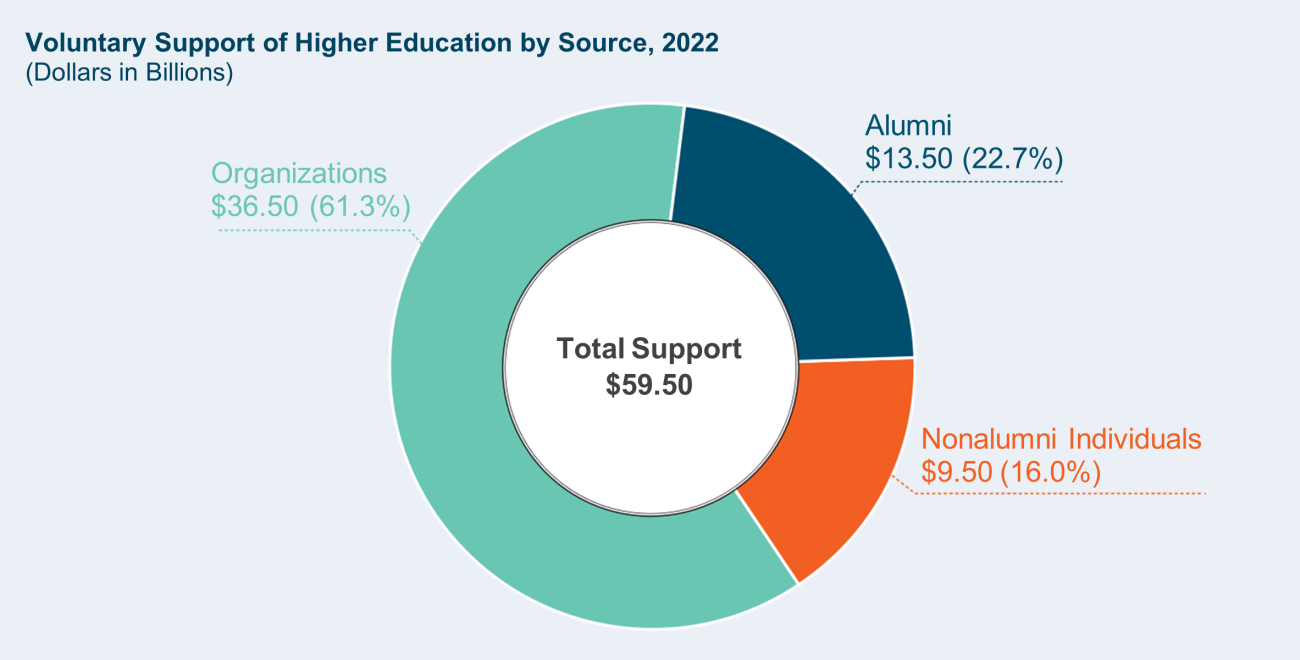Giving to U.S. Colleges and Universities Increased 12.5% in Fiscal Year 2022
WASHINGTON, D.C. — Giving to U.S. higher education institutions rose 12.5% in the fiscal year ending June 30, 2022, according to the Council for Advancement and Support of Education Insights on Voluntary Support of Education survey findings released today. Total support reached $59.50 billion, up from $52.90 billion in 2021.

The VSE survey, under the auspices of the newly branded CASE Insights, is the definitive source of data for measuring the level of philanthropic support for nonprofit and public higher education institutions in the United States.
The 2022 rise in contributions was fueled by increased donations to both restricted endowments, which primarily fund scholarships, and to current operations with restrictions on use, which primarily fund research. Giving to restricted endowments rose 17.3%. Contributions to restricted current operations rose 6%. Together, these categories represent 79% of the total raised.
Giving from individuals and organizations continued to increase in 2022. Alumni giving grew 10.2%, while nonalumni individuals gave 8% more. Contributions from organizations rose 14.6%.
“The continued generosity during the most challenging period in generations demonstrates how strongly people value higher education in the United States,” says Sue Cunningham, CASE President and CEO. “The efforts of institutional and academic leaders working with advancement professionals to build strong and significant relationships with donors provide critical investment in the long-term success and wellbeing of our colleges and universities, which in turn contribute so much to their local and global communities.”
“Charitable contributions from every type of individual and organizational donor rose this year,” says Ann E. Kaplan, Senior Director of the Voluntary Support of Education program. “The stock market was strong in December 2021, and many donors made gifts then. Moreover, some organizational donors determine gift and grant levels on an even earlier date, making commitments a year or more in advance.”
Although most types of institutions reported that giving increased in 2022, contributions to two-year colleges declined 15.4%. Some institutions reported very large increases, while others reported stable or declining gift revenue.
Notably, some of these institutions received significant gifts from philanthropist MacKenzie Scott in 2021. While these were one-time contributions, they transformed some institutions and enabled them to enhance their programming and become more stable.
Contributions to all other types of institutions, except public master’s institutions, rose. Several public master’s institutions were also recipients of Scott’s generosity in 2021.
The number of gifts totaling $100 million or more was lower than last year. There were nine gifts of such magnitude in 2021 and seven in 2022. However, the difference is not considered significant.
The VSE survey is the longest running survey on educational philanthropy. This year marks the first time it has been conducted with the CASE Global Reporting Standards, which CASE issued in 2021. The standards ensure consistency in fundraising reporting for institutions across the world and clarify how certain gifts should be recorded.
“This year’s data collection introduced several exciting changes that deepen our understanding of philanthropic giving to higher education institutions in the United States,” says Cara Giacomini, Vice President of Data, Research, and Technology at CASE. “In addition to integrating the CASE Global Reporting Standards into this survey, we added questions about giving by gift bands and by graduation cohorts. These new, optional questions and the addition of donor-advised funds as a distinct donor type will lead to deeper understanding about the nuances of donor activity.”
About CASE
CASE—the Council for Advancement and Support of Education—is a global, not-for-profit membership association with a vision to advance education to transform lives and society.
CASE is the home for advancement professionals, inspiring, challenging, and equipping them to act effectively and with integrity to champion the success of their institutions. CASE defines the competencies and standards for the profession of advancement, leading, and championing their dissemination and application with more than 97,000 advancement professionals at 3,100 member institutions in 80 countries.
Broad and growing communities of professionals gather under the global CASE umbrella. Currently these include alumni relations, development services, communications, fundraising, government relations, and marketing. These professionals are at all stages of their careers and may be working in universities, schools, colleges, cultural institutions, or other not-for-profits. CASE uses the intellectual capital and professional talents of a community of international volunteers to advance its work, and its membership includes many educational partners who work closely with the educational sector.
Headquartered in Washington, D.C., CASE works across all continents from its regional offices in London, Singapore, and Mexico City to achieve a seamless experience for all its stakeholders, particularly its members, volunteers, and staff.